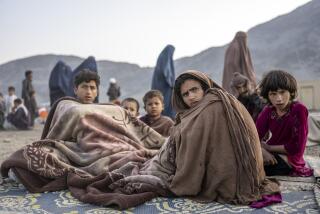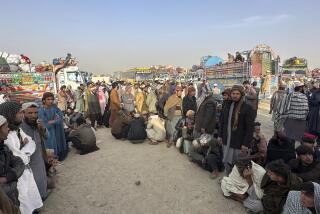Fugitive’s Trail Ended at Pakistani Holiday Inn : Terrorism: Suspicions were aroused over his bogus travel documents. He reportedly admitted involvement in bombing.
NEW DELHI — The trail of one of the FBI’s 10 Most Wanted led to a bustling neighborhood of bazaars, markets and tailor shops in the capital of Pakistan and to a room at the Holiday Inn.
At the Islamabad hotel, a man checked in after arriving in the city last Sunday.
He gave his name as Ali Khan.
Pakistani authorities, who gave an account of the events, were instantly suspicious of the traveler and his identification documents, which they said obviously had been forged.
Plainclothes officers were deployed in the hotel to monitor the new guest’s activities and to trail him if he left.
After two days of watching, they pounced. Ali Khan was arrested with a minimum of fuss at the Holiday Inn.
In reality, he was Ramzi Ahmed Yousef, an Iraqi whom U.S. authorities had been willing to pay $2 million to capture.
Yousef, 27, is accused of masterminding the Feb. 26, 1993, bombing of the World Trade Center in New York, in which six people were killed and more than 1,000 were injured.
Pakistani Interior Minister Nasirullah Khan Babar said Thursday that he made the decision to extradite Yousef to the United States immediately.
“A crime is a crime, no matter where it is committed,” Babar said. “When human beings are killed, we have to take action.”
After being extradited Wednesday night, Yousef pleaded not guilty to the charges against him in New York on Thursday.
In an interview with the BBC, Babar said that Yousef admitted his involvement in the bombing to Pakistani interrogators after his arrest.
Yousef was traveling from Bangkok, Thailand, under a bogus Pakistani passport, Babar said. When arrested, two suitcases were found in his room.
One was empty but the other contained two toy cars packed with explosives and cotton wool soaked in liquid explosive, Babar said.
Another top Pakistani government official, who spoke on condition he not be named, said that the United States asked Pakistan as long ago as May, 1993, to extradite Yousef. Interpol also issued a “red alert,” he said.
“He was noted by the Pakistan intelligence agencies who couldn’t confirm his identity, so we put him under surveillance,” the high-ranking official said Thursday.
“Two days ago, we confirmed his identity and arrested him,” he said. “The process of law was carried out, and since then he has been extradited.”
Yousef’s capture and speedy extradition was a feather in the Pakistanis’ cap at a difficult juncture in their relations with the United States, and within two months of Prime Minister Benazir Bhutto’s upcoming visit to Washington.
But the episode also served as a reminder of the Islamic republic’s trouble controlling terrorism and the unexpected side effects of the old Cold War decision by the United States to bankroll Muslim “holy warriors” in Soviet-occupied Afghanistan.
U.S. prosecutors have said that Yousef received bomb-making training in the northwestern Pakistani city of Peshawar, which served as the headquarters-in-exile of many of the Afghan rebel groups that fought the old Soviet-backed regime that was toppled in 1992.
Yousef is believed to have fought alongside the Muslim moujahedeen in Afghanistan, but Pakistani authorities said Thursday that they could not confirm it.
If he did, there is a chance his training was paid for by the United States, which funneled billions of dollars in aid to Afghan groups combatting Soviet troops and the Communist government in Kabul.
“During the Afghan jihad (holy war), there were a lot of people who came here to fight the jihad and they were trained by various agencies from various countries,” Foreign Ministry spokesman Munir Akram said.
“We do not have any specific information about who this gentleman (Yousef) is, whether he was trained in Afghanistan or in some other country,” Akram said.
Islamabad-based Western diplomats say several Afghan groups involved in that country’s ongoing civil war, including the party of President Burhanuddin Rabbani and those of some of his opponents, still operate military camps inside Afghanistan for money, and that some foreigners go there to learn combat skills.
*
The irony is that the United States financed much of this training during the anti-Communist phase of the Afghan war.
Gulbuddin Hekmatyar’s Hezb-i-Islami party received most of the U.S. aid to the moujahedeen. Today, Western diplomats say, Hekmatyar’s group still operates training camps as a revenue source, charging the Arabs who come to train there for imparting “expertise.”
“If Afghanistan didn’t exist, it would be harder to find training,” one diplomat said. “There are fewer and fewer places to go for training.”
At the end of 1993, Pakistani officials reported that they had deported more than 600 Arab nationals in an effort to crack down on terrorism. Most were Egyptian, Algerian, Syrian and Saudi. But nearly all refused to return home and the Pakistanis said that they opted instead to go to Libya, Yemen and Iran.
Many Muslim militants from the Arab world took part in the Afghan civil war and helped to force the Soviet withdrawal in 1989. Since the crackdown in Pakistan, most are said to have gone underground and now operate along the border of Afghanistan--a veritable no-man’s-land where Pakistani federal laws do not apply.
Pakistani officials claim that these mercenaries are financing their operations by selling drugs. Pakistan is the world’s third-largest opium producer, after Myanmar and Afghanistan, and U.N. officials estimate that the Pakistani drug trade is worth $2.25 billion annually.
*
That is likely to be one of the contentious issues when Bhutto flies to the United States in April for talks with President Clinton and a stop in Los Angeles. Pakistani officials are known to be concerned that their failure to stem drug trafficking could lead to a U.S. decision that might result in reduced international aid.
Bhutto was reportedly given a warning to that effect by Lee P. Brown, director of the White House Office of Drug Control Policy, last autumn during his visit to Islamabad. Against that background, Pakistan’s decision this week to speedily hand over Yousef may have been intended as a dramatic gesture toward American concerns.
In coming months, under U.S. law, Clinton must inform Congress whether Bhutto’s government has done enough to control drug production and trafficking.
Without so-called certification, diplomats say, the United States would be obliged to vote against international loans to Pakistan, including by the World Bank and the International Monetary Fund.
A consortium of donors is to meet soon in Paris to decide on aid to Pakistan. Last year, the World Bank provided $2.5 billion in assistance.
Diplomats in Islamabad say a recent flurry of activity on the anti-drug front, including imposition of the death penalty for trafficking, huge heroin hauls and the freezing and eventual seizure of drug lords’ assets, could be a last-minute attempt by Pakistan to short-circuit a cutoff of aid.
On Wednesday, Pakistan informed six citizens convicted of narcotics-related felonies that they could be extradited to the United States on heroin trafficking charges. The six have the right to appeal, which could throw their cases back into Pakistani courts.
Times special correspondent Jennifer Griffin in Islamabad contributed to this story.
More to Read
Sign up for Essential California
The most important California stories and recommendations in your inbox every morning.
You may occasionally receive promotional content from the Los Angeles Times.










